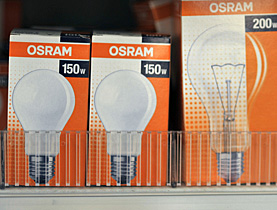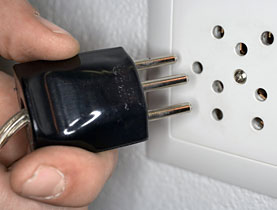Swiss to switch off traditional light bulbs

Like the European Union, Switzerland intends to ban energy-guzzling light bulbs, and started its own measures before those of the 27-member body.
With lighting accounting for up to 15 per cent of energy consumption in Swiss households, green bulbs are expected to produce significant energy and cost savings, as well as help protect the environment.
The EU started phasing out the manufacture and import of 100-watt and frosted incandescent light bulbs on Tuesday.
These are to be replaced by energy-efficient fluorescent or halogen lamps, which use up to 80 per cent less electricity.
The ban will be extended to all incandescent bulbs by 2012, as part of wider efforts to fight climate change.
Switzerland, which is not an EU member, is roughly doing the same, says Marianne Zünd, spokeswoman at the Federal Energy Office.
“We already started at the beginning of 2009 when the Swiss government set new regulations for Swiss light bulbs. We did it a bit differently to the EU, but in the end we’ll have the same result,” Zünd told swissinfo.ch.
Enlightened Swiss
Sales of household bulbs with the lowest efficiency levels (categories F and G, A being the most efficient) were stopped on January 1, 2009.
Switzerland will officially follow the EU’s line on 100W lamps from September 1, 2010, Zünd said. From 2012, only bulbs meeting or exceeding category D requirements will be on sale – the equivalent to banning conventional light bulbs. Unlike in the EU, Swiss shops won’t be able to sell off their stocks, she added.
But some big retailers are going their own way. Supermarket Coop is voluntarily following the EU regulations. “Environmental concerns were at the centre of this decision,” Coop spokeswoman Susanne Sugimoto said via email.
Biggest retailer Migros has taken frosted light bulbs off its shelves. Both chains have put more emphasis on energy-saving lamps.
Savings of all kinds
For Felix Meier, head of the consumption and lifestyle section of the environmental group WWF Switzerland, the official switch to energy-saving lamps is good news, even if it could move a little faster.
“If you consider that ten to 15 per cent of energy consumption in households is through light, then you can significantly save energy by using energy saving bulbs and of course protect the climate,” he told swissinfo.ch.
These lamps are more expensive to buy, but their longer lifespan means savings of around SFr100 ($94) per bulb in the long run, added Meier, who recommends that consumers switch to the new bulbs as soon as possible.
Currently, around 15-20 per cent of bulbs sold in Switzerland are “green”, according to the WWF.
Light bulb hoarding
However, some people still need convincing. Shopkeepers in the EU have reported people bulk buying 100W bulbs for cost or sentimental reasons.
Sugimoto said that Coop had noticed a “small increase” in sales of normal light bulbs, but that the media had generally not reported on the changeover in its shops.
“Instead clients are surprised when they can’t find any frosted light bulbs any more. On the other hand we are seeing that even without this change in our selection, there is a strong increase in sales of energy-efficient bulbs,” she said.
Zünd says Switzerland is in a transition phase. “It’s something new and people have to get used to it, it’s always the same when you have a change in technology, it’s hard to convince people that it’s for the best. It’ll take some time,” she said.
Out of the dark
Traditional incandescent bulbs have not advanced much since they were first produced commercially by Thomas Edison in 1879.
Efficiency improvements reached a limit around 50 years ago. Overall these bulbs release 95 per cent of their energy as heat and five per cent as light.
The EU and Switzerland are not alone in switching off these bulbs. Australia, New Zealand, Canada and the Philippines have already announced that they will phase out or restrict sales.
“On a worldwide scale, energy-saving bulbs are very important and Switzerland can of course make a contribution here,” Meier said.
“Around 20 per cent of global energy consumption is due to light and if one can save 60-80 per cent without any side effects such as having less light or not such good light, then it’s a very comfortable way of saving energy for everyone.
“In addition, looking at the whole cost picture, you save money as well.”
Isobel Leybold-Johnson, swissinfo.ch
Traditional light bulb (incandescent light bulb)
This works by incandescence – heat-driven light emissions. An electric current passes through a thin filament, heating it until it produces light. Inert gas inside the bulb protects filament and improves luminescence.
With the conventional light bulb, 95 per cent of the energy is released in the form of heat, while only 5 per cent is in the form of visible light.
It has been in use since the 19th century.
Energy saving light bulb (compact fluorescent lamp)
Most of these are designed to fit into light fixtures in which incandescent lamps have been used.
The bulb requires 20-23 Watts of electricity to generate the same amount of light as a 100W bulb. It lives longer, but is more expensive.
It has been around in its modern form since the early 1970s.
The revised Energy Ordinance now specifies requirements on household lamps for the first time. Since January 1, 2009 all F and G bulbs in the EU Energy Label scheme have been banned.
The Swiss will follow EU regulations on bulbs from September 1, 2010 and by 2012 only bulbs that meet at least the D efficiency requirements (A is highest) will be sold. This is effectively a ban on conventional light bulbs.
These regulations apply to shops only. People seeking to buy old-fashioned bulbs from other avenues (internet, black market) will not be penalised, the Federal Energy Office says.

In compliance with the JTI standards
More: SWI swissinfo.ch certified by the Journalism Trust Initiative













You can find an overview of ongoing debates with our journalists here . Please join us!
If you want to start a conversation about a topic raised in this article or want to report factual errors, email us at english@swissinfo.ch.